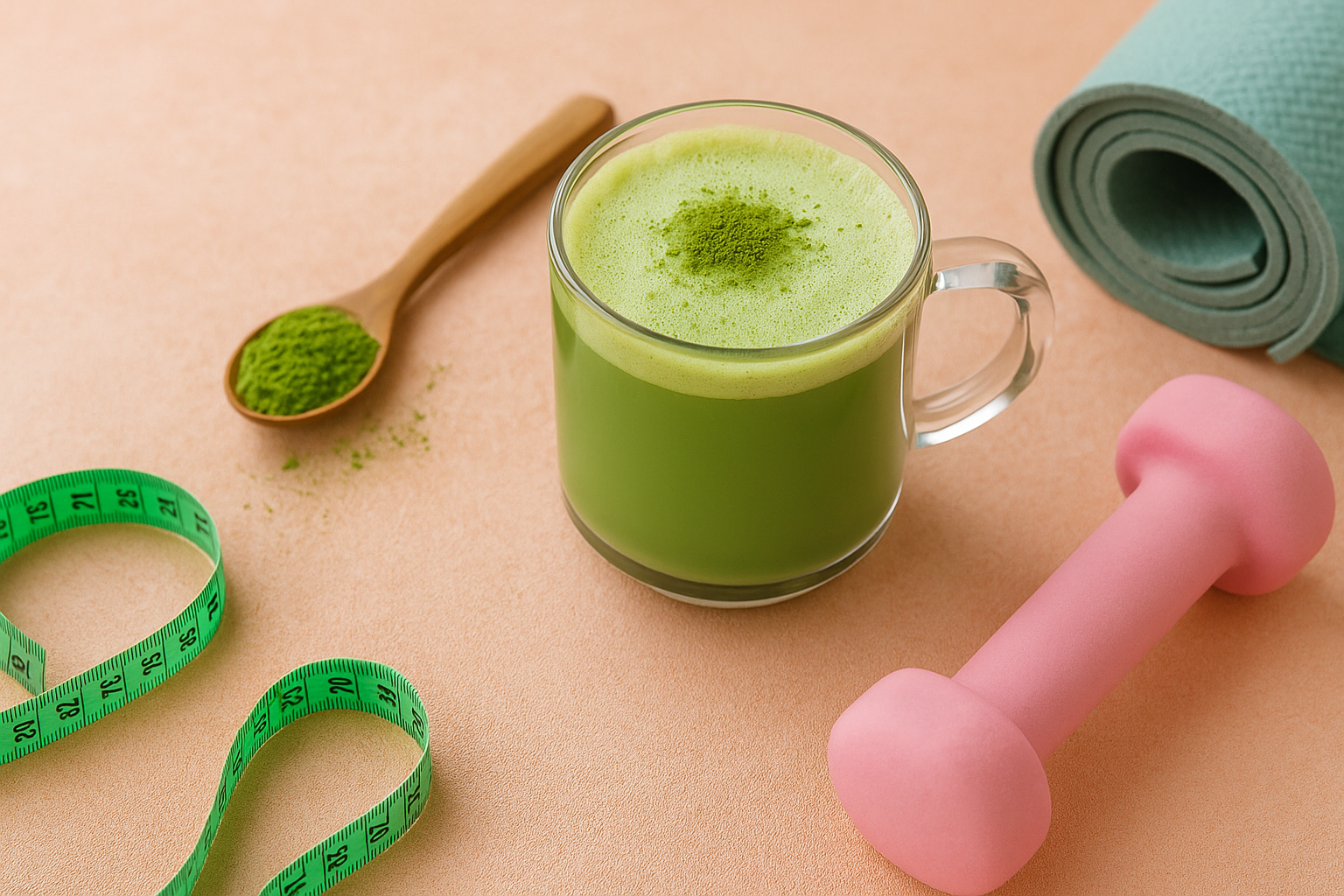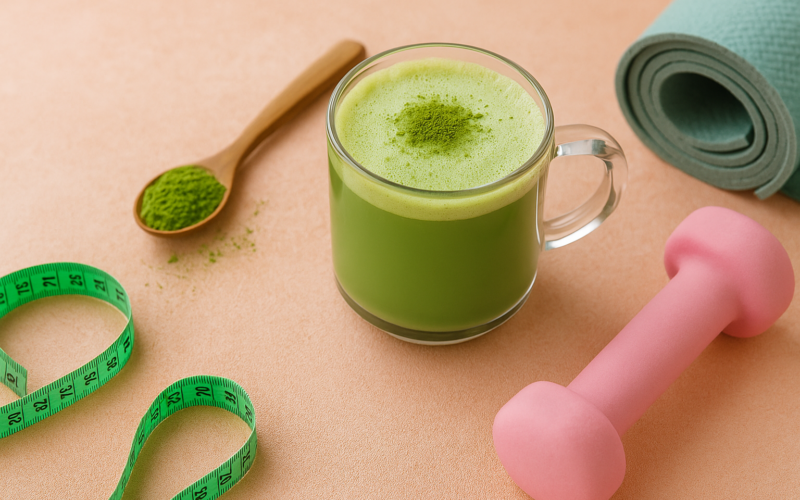Is Matcha Good for Weight Loss? Everything You Need to Know
If you’ve ever wondered “is matcha good for weight loss?” you’re definitely not alone. Matcha has become the darling of wellness girlies everywhere, from TikTok to fitness blogs, and it’s not just because of its vibrant green color or aesthetic foam art in a matcha latte. Behind the aesthetic is a superfood that has a rich history and some powerful science-backed benefits that could actually support your weight loss goals and overall glow-up.
In this post, we’re going to break it down in a way that’s both real and relatable. We’ll talk about what makes matcha unique, how it can influence body weight, fat oxidation, and waist circumference, the best time to drink it, and some practical tips to add it into your daily routine without falling for trends or misinformation.
What Exactly Is Matcha?
Matcha is a type of green tea powder made by grinding the whole leaf of the camellia sinensis plant into a finely ground powder. Unlike regular green tea, where you steep the leaves in hot water and remove them, drinking matcha means consuming the entire leaf. That’s why it contains a high concentration of catechins, amino acids, and other beneficial compounds that make it stand out.
Traditionally, matcha has been used in Japanese tea ceremonies for centuries. The ritual involves a bamboo whisk, patience, and intention. This is where the idea of ceremonial-grade matcha comes from, which is the high-quality matcha you’ll want for sipping in its pure form. The unique flavor has a slight bitter taste, grassy notes, and a smooth finish that people often enhance with oat milk or coconut milk in a matcha latte.
So beyond the wellness aesthetic, this traditional matcha tea has a rich history and deep roots in Japanese matcha culture.
P.S: If you’re new to Matcha, make sure you purchase a starter kit and not just the Matcha powder. I made that mistake when I started and took forever to get every piece need. A matcha starter kit is the easiest way.
Why Matcha Can Support Weight Loss

Now let’s get into the good stuff. Does matcha really help with weight management? The short answer: yes, it can — but it works best as part of a balanced diet and regular exercise routine, not as a magic solution.
Here are the main mechanisms of matcha that play a role in weight loss benefits:
1. Boosts Metabolism
Matcha contains epigallocatechin gallate (EGCG), a catechin known for its ability to boost metabolism and increase energy expenditure. In simple terms, it helps your body burn more calories, even at rest.
2. Enhances Fat Oxidation
Drinking a cup of matcha before physical activity has been linked to greater fat oxidation — meaning your body is more likely to use fat for fuel during workouts. Over time, this can support body fat reduction and contribute to significant weight loss when paired with regular exercise.
3. Sustained Energy Boost
Thanks to its unique combination of caffeine and the presence of L-theanine (an amino acid), matcha provides a sustained energy boost without the jitters or crash that can come with a cup of coffee. This steady energy levels support more consistent physical activity and better daily routine habits, which are key for anyone with weight loss goals.
4. Regulates Blood Sugar
Matcha may help improve blood sugar stability, which reduces cravings and helps avoid energy crashes that often lead to overeating. Stable blood sugar means less temptation to reach for quick snacks that don’t align with your healthy lifestyle.
5. Supports Heart Health and Beyond
While the focus is often on fat burning, let’s not forget about the numerous health benefits of matcha overall. Research connects green tea consumption with improved heart health, lower blood pressure, reduced risk of cardiovascular disease and heart disease, and better management of metabolic disorders. So even beyond the scale, the beneficial effects on your immune system, cognitive function, and gut microbiome make it worth adding to your day.
How Much Matcha Should You Drink for Weight Loss?

This is where a lot of confusion comes in. People see influencers downing three matcha lattes a day and wonder if they should do the same. But excessive consumption isn’t the goal.
The average teaspoon of matcha contains about 60–80 mg of caffeine, depending on the brand and quality. For reference, a cup of coffee can have anywhere from 95–200 mg of caffeine.
Most experts suggest sticking to one or two servings a day (about one to two teaspoons of matcha powder whisked into hot water or milk). This amount provides the beneficial compounds without risking negative side effects like disrupted sleep, jitters, or increased heart rate.
If you’re sensitive to caffeine, start with half a teaspoon of matcha and see how your body responds. And as always, if you have specific health concerns, check in with a healthcare provider before making it a daily habit.
Best Time to Drink Matcha for Weight Loss
Timing matters. Here’s when to make matcha part of your daily routine if your focus is weight loss benefits:
-
Morning: Swap your cup of coffee for a cup of matcha to start your day with a steady sustained energy boost and mental clarity.
-
Pre-Workout: Drinking matcha 30–45 minutes before physical activity may enhance fat oxidation, making your sweat session more effective.
-
Afternoon Slump: Instead of reaching for another coffee, a matcha latte provides enough mg of caffeine to lift your energy levels without disrupting sleep.
The best time is ultimately when it fits seamlessly into your daily life. The goal is consistent regular consumption of green tea in a way that supports your balanced diet and healthy lifestyle.
Matcha vs Regular Green Tea
Both come from the same tea plant and both have amazing beneficial effects, but they’re not the same.
-
Regular green tea: Made by steeping green tea leaves in hot water. You consume the infusion, not the whole leaf.
-
Matcha powder: Made from shade-grown leaves ground into a fine powder, so you consume the entire leaf, giving you a much higher concentration of powerful antioxidants, catechins, and fatty acids.
This is why matcha has more mg of catechins, more beneficial compounds, and greater health benefits of matcha tea compared to other types of green tea.
Practical Tips to Add Matcha Into Your Routine
Here’s how to start drinking matcha in a way that supports your weight loss goals and your overall health:
-
Choose high-quality matcha – Look for ceremonial-grade matcha with a vibrant green color. This ensures you’re getting a finely ground powder with maximum potency.
-
Make it properly – Use a bamboo whisk to mix one teaspoon of matcha with a splash of hot water, then add more water or milk of choice. Whisking removes clumps and brings out the unique flavor.
-
Upgrade your latte – If a bitter taste puts you off, try a matcha latte with oat milk or coconut milk for a creamier texture.
-
Be mindful of add-ins – Skip the syrups and heavy sweeteners. Keep it aligned with your weight loss goals by adding honey or stevia instead.
-
Pair with physical activity – Drink your cup of matcha before workouts to maximize fat burning and lipid metabolism.
-
Stay consistent – The beneficial effects of matcha are best with regular consumption of green tea, not just once in a while.
Are There Any Downsides?
Yes, even with the numerous health benefits, there are a few things to keep in mind:
-
Excessive consumption of matcha can lead to insomnia, anxiety, or elevated heart rate due to its caffeine content.
-
Some people experience stomach discomfort if they drink too much on an empty stomach.
-
Matcha can interact with some dietary supplements or medications. Always check with your healthcare provider if you’re unsure.
As with anything, moderation is key. Think of matcha as a powerful tool in your healthy lifestyle, not a cure-all.
Final Thoughts: Is Matcha the Right Choice for You?
So, is matcha good for weight loss? Absolutely — but in the right way. When added to a balanced diet, paired with regular exercise, and enjoyed as part of a healthy lifestyle, matcha can be a game-changer.
Its unique blend of caffeine content, presence of L-theanine, and high concentration of catechins makes it more than just a trendy drink. It’s a wellness ritual with the power to support body weight management, improve waist circumference, stabilize blood sugar, and contribute to better heart health.
At the end of the day, the best body is the one that feels healthy, energized, and confident. If a cup of matcha fits into your daily routine and makes you feel good, then it’s definitely the right choice.

